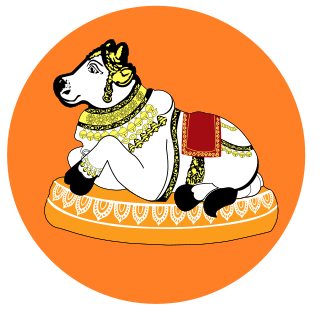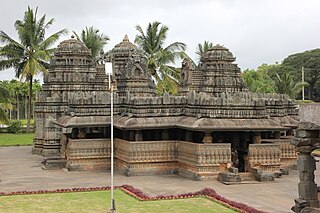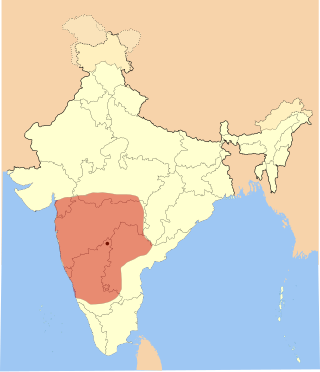
Lingayatism is a Hindu denomination based on Shaivism. Initially known as Veerashaivas, since the 12th-century adherents of this faith are known as Lingayats.

Basava (1131–1196), also called Basavēśvara and Basavaṇṇa, was an Indian philosopher, poet, Lingayat social reformer in the Shiva-focused bhakti movement, and a Hindu Shaivite social reformer during the reign of the Kalyani Chalukya/Kalachuri dynasty. Basava was active during the rule of both dynasties but reached the peak of his influence during the rule of King Bijjala II in Karnataka, India.

Akka Mahadevi was one of the early poets of Kannada literature and a prominent person in the Lingayat Shaiva sect in the 12th century. Her 430 Vachana poems, and the two short writings called Mantrogopya and the Yogangatrividh are considered her known contributions to Kannada literature. She composed fewer poems than other saints of the movement. The term Akka is an honorific given to her by saints such as Basavanna, Siddharama and Allamaprabhu and an indication of her high place in the spiritual discussions held at the "Anubhava Mantapa". She is seen as an inspirational woman in Kannada literature and in the history of Karnataka. She considered the god Shiva as her husband,.

Basavakalyana is a historical city and municipal council in the Bidar District of the Indian state of Karnataka. It was the capital of two dynasties—Kalyani Chalukya and Kalachuris of Kalyani. It is famous for the world's tallest Basavanna statue, which stands 108 feet high. It is one of the major cities and industrial hubs of Bidar district.

Allamaprabhu was a 12th-century mystic-saint and Vachana poet of the Kannada language, propagating the unitary consciousness of Self and Shiva. Allamaprabhu is one of the celebrated poets and the patron saint of the Lingayata movement that reshaped medieval Karnataka society and popular Kannada literature. He is included among the "Trinity of Lingayathism", along with Basavanna, the founder of the movement, and Akka Mahadevi, the most prominent woman poet.

Balligavi a town in Shikaripura taluk Shivamogga district of Karnataka state, India, is today known as Belagami or Balagame. Its ancient names are Baligrama, Dakshina Kedara, Valliggame and Valligrame. Dakshina Kedara means Kedarnath of the South. A place of antiquity, it is known for its ancient monuments. Balligavi is located 72 km from Shivamogga city and 21 km from Shikaripura town and 2.3 km from Shiralakoppa in Shikaripura taluk. Balli in Kannada means creeper or vine.
Channabasavanna also known as " Guru Channabasaveshwara " was Basava's nephew and one of the foremost Sharanas of the 12th century. He, along with Basava, Allama Prabhu and Akka Mahadevi, played a pivotal role in the propagation of the Lingayat faith. He was the youngest among the sharana leaders and grew up in the household of Basavanna as he was the son of Nagalambike, Basava's own sister. He also wrote the Karana Hasuge which is one of the most sacred texts of the Lingayats, among many vachanas. He propounded the "shatasthala" philosophy associated with the six holy places of Veerashaiva Lingayat creed. He succeeded to the Shunya Simhasana at Anubhava Mantapa, Kalyana after the departure of Allama Prabhu, circa 1162ad. His young shoulders carried on the legacy of Basava after the latter's departure to Kudalasangama in 1162ad. He is credited to have systematised the entire manual of simple rituals for the followers. He was a strong advocate of the Ishtalinga wearing and expounded the material as well as the esoteric meaning of that divine symbol. He held together the nascent group of Shivasharanas and Jangmas in tumultuous times of clashes with the orthodox Brahmins and heretic Jains. Following the assassination of Kalachuri King Bijjala II in 1167 A.D, Channabasava along with his followers migrated to Ulavi safeguarding the Vachana literature. He attained Samadhi state there at the age of 25 passing on the leadership of the movement to Siddarama.

Kudalasangama in India is an important centre of pilgrimage for Lingayats. It is located about 15 kilometres (9.3 mi) from the Almatti Dam in Bagalkote district of Karnataka state. The Krishna and Malaprabha River rivers merge here and flow east towards Srisailam Andhra Pradesh. The Aikya Mantapa or the holy Samādhi of Basavanna, the founder of the Lingayatism along with Linga, which is believed to be self-born (Swayambhu), is here. The Kudala Sangama Development Board takes care of the maintenance and development.

A large body of Western Chalukya literature in the Kannada language was produced during the reign of the Western Chalukya Empire in what is now southern India. This dynasty, which ruled most of the western Deccan in South India, is sometimes called the Kalyani Chalukya dynasty after its royal capital at Kalyani, and sometimes called the Later Chalukya dynasty for its theoretical relationship to the 6th-century Chalukya dynasty of Badami. For a brief period (1162–1183), the Kalachuris of Kalyani, a dynasty of kings who had earlier migrated to the Karnataka region from central India and served as vassals for several generations, exploited the growing weakness of their overlords and annexed the Kalyani. Around 1183, the last Chalukya scion, Someshvara IV, overthrew the Kalachuris to regain control of the royal city. But his efforts were in vain, as other prominent Chalukya vassals in the Deccan, the Hoysalas, the Kakatiyas and the Seunas destroyed the remnants of the Chalukya power.
Chamarasa was a 15th century Virashaiva poet in the Kannada language, during the reign of Vijayanagar Empire, a powerful empire in Southern India during 14th - 16th centuries. A contemporary and competitor to a noted Brahmin Kannada poet Kumara Vyasa, Chamarasa was patronised by King Deva Raya II. The work is in 25 chapters (gatis) comprising 1111 six-line verses (arupadi).

Vachana sahitya is a form of rhythmic writing in Kannada that evolved in the 11th century and flourished in the 12th century, as a part of the Sharana movement. The word "vachanas" literally means "(that which is) said". These are readily intelligible prose texts. These writings are notable for their simplicity and directness, often addressing social issues and personal devotion. They were composed in Kannada by saints of the Lingayat faith, most notably Basavanna, Akka Mahadevi, and Allama Prabhu. Vachanas critique rituals and caste discrimination, advocating a form of worship centered on Shiva, envisioned as a universal god.
Basava Jayanthi is a holiday traditionally observed by the Lingayats of the Indian state of Karnataka. It marks the birthday of Basavanna, a 12th-century poet-philosopher and the founding saint of the Lingayat tradition. The holiday is celebrated throughout South India, primarily in Karnataka, Maharashtra, Telangana and Andhra Pradesh.
Channappa Daniel Uttangi was an Indian author and poet.
Dr Poojya Maate Mahadevi MA, B.Sc.(13 March 1946 – 14 March 2019) was an Indian Spiritual leader, scholar, mystic, writer and first female Jagadguru, spiritual head of the Indian Lingayat community.

Siddheshwar also known as Siddharameshwar and Siddharama was one among the five acharya ("saint") of the Veerashaiva faith. Siddheshwar was a great contributor to Lingayat sampradaya of Hinduism. He was a great mystic and a Kannada poet who was a part of Basavanna's Lingayat revolution during the 12th century. His philosophy was one of service to mankind, the path of Shivayoga. Siddarama was instrumental in saving the vachana literature from destruction. Shri Siddharameshwar was born in Solapur City of Maharashtra.

Hinduism is the most followed Religion in India and nearly 84% of the total population of Karnataka follows Hinduism, as per 2011 Census of India. Several great empires and dynasties have ruled over Karnataka and many of them have contributed richly to the growth of Hinduism, its temple culture and social development. These developments have reinforced the "Householder tradition", which is of disciplined domesticity, though the saints who propagated Hinduism in the state and in the country were themselves ascetics. The Bhakti movement, of Hindu origin, is devoted to the worship of Shiva and Vishnu; it had a telling impact on the sociocultural ethos of Karnataka from the 12th century onwards.
The term Shiva Sharanas/Sarana can be roughly explained as devotees of Shiva. The 12th century Vachanakaras are also known by this name. Sharana is somebody who has surrendered oneself to the will of the Lord. Sharanu is derived from this term and it denotes the action of surrendering to or an act of respecting others. This term is seen in many Vachanas composed by the Vachanakaras namely Basavanna, Allama Prabhu, Akka Mahadevi and Madivala Machideva. The Vachanakaras, surrendering themselves to the will of Lord Shiva, have glorified and praised the forms of Lord Shiva. Not only this, the term signifies profound philosophical meanings. A sharana is given a prime place in the schematic world of Vachanas. An example for elevated position of a sharana is the following vachana of Basavanna.
Kranthiyogi Basavanna is a 1983 Indian Kannada-language film, directed by K. S. L. Swamy (Ravee). The film stars Ashok, Aarathi, Srinivasa Murthy, Manjula, Hema Chowdhary. The film has musical score by M. Ranga Rao. This movie is about life of one of the greatest social reformer of India Vishwa Guru Basavanna. He is the founder of Lingayat religion. Basavanna was first on earth to come up with idea of a parliament. In 12th century, Basavanna formed the first parliament in the world called "Anubhava Mantapa".

Allama is a 2017 Indian Kannada musical drama Historical film directed by T. S. Nagabharana. The film stars Dhananjay and Meghana Raj in the lead roles. Principal photography of the film started in late 2015. It was released theatrically on 26 January 2017.
Haralayya was a 12th-century Dalit saint and poet of Vachana sahitya in India. He joined Anubhava Mantapa, the hall created by Basava, where every caste was welcome.












